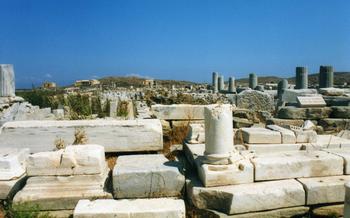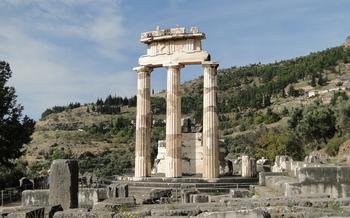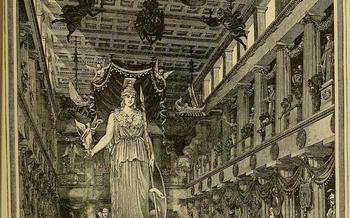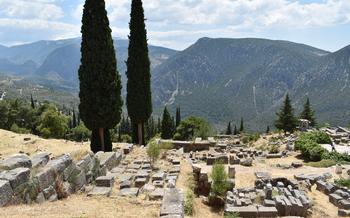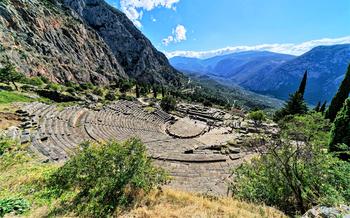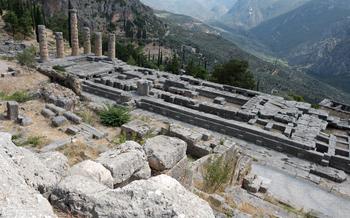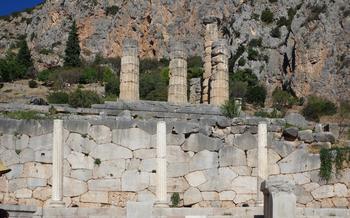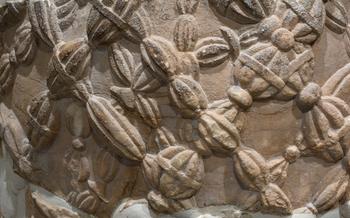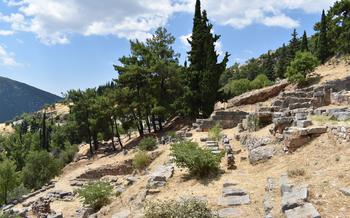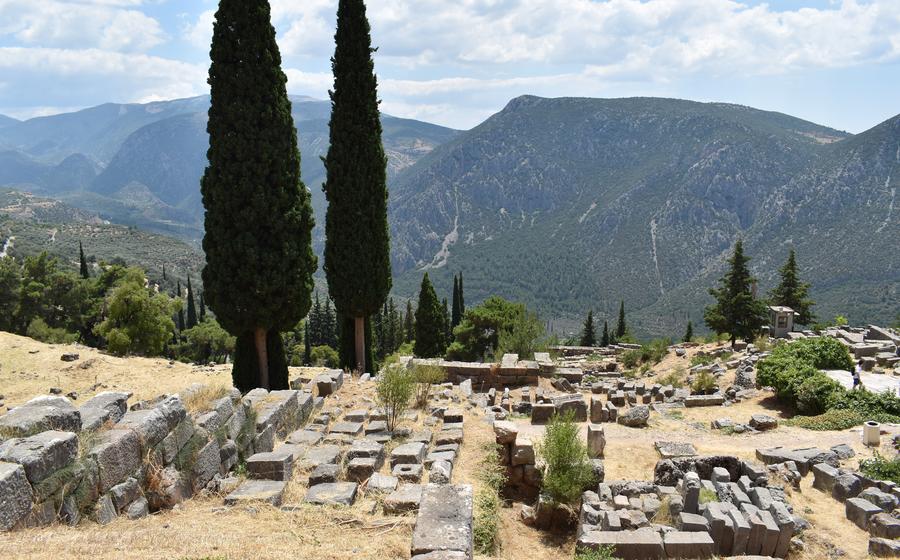
The Oracle of Trophonios
- Delphi: A Sacred Site in Ancient Greece
- The Oracle of Trophonios: A Mysterious Cult
- Location and Surroundings
- Historical Context and Origins
- Rituals and Practices
- The Oracle's Prophecies
- Cultural and Religious Significance
- Archaeological Discoveries
- Modern Interpretation and Legacy
- Visiting the Oracle of Trophonios Today:
- Practical Information:
- Making the Most of Your Visit:
- The Cave of Trophonios
- The Oracle's Influence on Greek History:
- The Sibyl of Delphi
- The Decline and Fall of the Oracle
- Insider Tip: Explore the Surrounding Area
Delphi: A Sacred Site in Ancient Greece
Delphi, nestled in the foothills of Mount Parnassus, was an ancient Greek city of immense sacred significance. It served as a renowned religious center, home to the renowned Oracle of Delphi, which drew people from far and wide seeking divine guidance and prophecies. The sanctuary of Apollo, the Greek god of prophecy, was the spiritual heart of Delphi, attracting pilgrims, statesmen, and ordinary people alike.
The location of Delphi was considered auspicious, believed to be the center of the world, marked by the omphalos, a sacred stone symbolizing the navel of the Earth. This central position added to the oracle's prestige and authority, making it a focal point for religious devotion and spiritual enlightenment.
The Oracle of Trophonios: A Mysterious Cult
The Oracle of Trophonios was a unique and enigmatic cult in ancient Greece, shrouded in mystery and revered for its prophetic powers. Located near the sanctuary of Apollo at Delphi, this oracle held a prominent position in the religious landscape of the ancient world.
The rituals associated with the Oracle of Trophonios were elaborate and highly secretive. Those seeking guidance from the oracle underwent a series of purification rituals, including fasting, bathing in cold water, and abstaining from certain foods and drinks. Once purified, they were led to a sacred cave, where they would descend into a deep chasm. Inside the cave, they would encounter the oracle, a mysterious figure who delivered prophecies in a trance-like state.
The prophecies of the Oracle of Trophonios were highly sought after and were believed to have a profound impact on the lives of those who consulted it. People from all walks of life, from ordinary citizens to kings and statesmen, flocked to Delphi to seek guidance on matters of personal, political, and military importance. The oracle's prophecies were often cryptic and ambiguous, requiring careful interpretation by the priests of Apollo.
Myths and legends abound regarding the Oracle of Trophonios, adding to its allure and mystique. One such legend tells of a hero named Trophonios who, along with his brother Agamedes, built a hidden treasury for the king of Orchomenus. After completing the treasury, the brothers trapped the king inside and escaped with his riches. As punishment for their treachery, Trophonios was swallowed by the earth, and his spirit became the oracle that bore his name.
Location and Surroundings
The Oracle of Trophonios is situated in a picturesque location on the slopes of Mount Parnassus, in close proximity to the renowned sanctuary of Delphi. The site offers breathtaking views of the surrounding landscape, characterized by lush greenery, towering mountains, and the glistening waters of the Gulf of Corinth.
Visitors to the oracle can immerse themselves in the natural beauty of the region, exploring the scenic trails and paths that wind through the mountainous terrain. The area is a haven for nature enthusiasts, offering ample opportunities for hiking, mountain biking, and birdwatching.
Reaching the Oracle of Trophonios is relatively straightforward. Visitors can travel by car or take advantage of the convenient public transportation options available from Delphi. Guided tours are also offered, providing visitors with insightful commentary and historical context as they explore the site.
In addition to the oracle, the surrounding area boasts a wealth of attractions and points of interest. The ancient city of Delphi, with its well-preserved ruins and the iconic Temple of Apollo, is a must-visit destination. Other nearby highlights include the picturesque village of Arachova, known for its traditional architecture and stunning mountain views, as well as the Hosios Loukas Monastery, a UNESCO World Heritage Site renowned for its exquisite Byzantine mosaics.
Historical Context and Origins
The Oracle of Trophonios emerged during a pivotal period in ancient Greek history, a time marked by profound religious and cultural transformations. The oracle's origins can be traced back to the 6th century BC, coinciding with the rise of the Delphic oracle and the growing influence of Apollo, the god of prophecy.
The oracle's establishment was deeply rooted in ancient Greek religious beliefs and practices. Oracles were considered sacred conduits between the mortal world and the divine realm, providing guidance and counsel to those seeking answers to life's most pressing questions. The Oracle of Trophonios, dedicated to the enigmatic hero-god Trophonios, was no exception.
Archaeological evidence suggests that the oracle's origins may predate the formal establishment of the cult. Excavations at the site have uncovered remnants of an earlier shrine dedicated to Trophonios, indicating the existence of a local hero cult that predated the oracle's association with Apollo and the Delphic sanctuary.
Historical accounts and myths provide further insights into the oracle's origins. According to legend, Trophonios was a skilled architect who, along with his brother Agamedes, built the legendary treasury of Hyrieus, king of Boeotia. After completing the treasury, the brothers secretly built a secret passageway leading to the treasure chamber. However, Hyrieus discovered their deception and trapped them inside, where they eventually starved to death.
In ancient Greek mythology, Trophonios was transformed into a hero-god after his death. His association with the underworld and his ability to communicate with the spirits of the dead made him an ideal intermediary between the mortal and divine realms, leading to the establishment of the oracle in his honor.
Rituals and Practices
The rituals associated with consulting the Oracle of Trophonios were elaborate and shrouded in secrecy. Those seeking guidance from the oracle underwent a rigorous purification process, which included fasting, bathing in sacred springs, and abstaining from certain foods and behaviors. Once purified, the seeker would descend into the cave of Trophonios, accompanied by a priest or guide.
Within the cave, the seeker would lie down on a cot and enter a trance-like state. As they slept, they would receive visions or dreams, which were believed to contain prophetic messages from Trophonios. Upon awakening, the seeker would recount their dreams to a priest, who would then interpret their meaning.
The interpretation of dreams was a complex process, requiring knowledge of symbolism and ancient Greek mythology. The priest would carefully analyze the seeker's dreams, searching for hidden messages and omens. The oracle's response, often cryptic and ambiguous, was believed to provide guidance and insight into the seeker's future.
The Oracle's Prophecies
The Oracle of Trophonios was renowned for its accurate and influential prophecies, which played a significant role in shaping the course of ancient Greek history. One of the most famous prophecies delivered by the oracle was to the Athenian general Miltiades before the Battle of Marathon in 490 BC. The oracle advised Miltiades that he would be victorious if he "attacked at the right time." Miltiades heeded the oracle's advice and led the Athenians to a resounding victory over the invading Persian army, marking a turning point in the Greco-Persian Wars.
Another notable prophecy was given to the Spartan king Agesilaus II in 396 BC. The oracle warned Agesilaus that if he invaded Persia, he would "bring down a great empire." Agesilaus ignored the warning and invaded Persia, but his campaign was ultimately unsuccessful, leading to the decline of Spartan power.
The oracle's prophecies were not always accurate, however. In 335 BC, the oracle predicted that Alexander the Great would conquer the world. While Alexander did indeed achieve great military success, he died prematurely at the age of 32, leaving his empire to be divided among his generals.
Despite the occasional inaccuracy, the Oracle of Trophonios's prophecies were widely respected and sought after by individuals and city-states alike. The oracle's influence extended far beyond Delphi, as its prophecies shaped political and military decisions throughout the ancient Greek world.
Cultural and Religious Significance
The Oracle of Trophonios held immense cultural and religious significance in ancient Greece. It was deeply embedded in the fabric of Greek society, serving as a source of guidance, wisdom, and spiritual insight. The oracle's prophecies influenced not only personal decisions but also major historical events and political strategies.
The oracle's connection to the god Apollo, one of the most revered deities in the Greek pantheon, further elevated its status. Apollo was associated with prophecy, healing, and the arts, and his presence at Delphi added to the oracle's prestige and authority.
Seeking guidance from the oracle was considered a sacred act, and those who consulted it often underwent rigorous preparation and purification rituals beforehand. The oracle's responses were believed to be divine messages, and people from all walks of life, including kings, statesmen, and ordinary citizens, sought its counsel.
The oracle's influence extended beyond religious matters, deeply impacting Greek morality and ethics. Its prophecies often carried moral lessons and warnings, shaping societal values and guiding people's conduct. The oracle's teachings emphasized the importance of piety, justice, and self-control, contributing to the development of a strong moral compass in ancient Greek society.
The oracle also played a significant role in Greek mythology and literature. It featured prominently in myths and legends, inspiring countless stories, dramas, and works of art. The oracle's enigmatic prophecies and the mysterious figure of Trophonios captured the imagination of ancient Greek writers and artists, leaving a lasting legacy in Greek culture.
Archaeological Discoveries
Archaeological excavations conducted at the site of the Oracle of Trophonios have shed considerable light on the oracle's practices and rituals. The excavations, which began in the late 19th century and continued throughout the 20th century, have uncovered a wealth of artifacts and structural remains.
Among the most significant discoveries are inscriptions, which provide valuable information about the oracle's procedures and the types of questions that were asked. Statues and ritual objects have also been found, offering insights into the religious practices and beliefs associated with the oracle.
The excavations have also revealed the physical layout of the oracle's complex, including the cave where the consultations took place. The cave's acoustics have been the subject of particular interest, as they may have played a role in the oracle's rituals.
Ongoing research and analysis of the archaeological evidence continue to provide new insights into the Oracle of Trophonios. These discoveries enhance our understanding of this ancient oracle and its role in Greek religion and society.
Modern Interpretation and Legacy
Modern scholars and historians approach the Oracle of Trophonios with a mix of curiosity and skepticism. Some view the oracle as a fascinating window into ancient Greek religious practices and beliefs, while others question its authenticity and reliability. Comparative studies have been conducted, drawing parallels between the Oracle of Trophonios and other ancient oracles, such as the Oracle of Delphi and the Oracle of Dodona. These comparisons shed light on the commonalities and differences among these sacred sites and their roles in ancient Greek society.
The legacy of the Oracle of Trophonios extends beyond its historical significance. Its teachings and practices have influenced modern culture, art, and literature. References to the oracle can be found in works of fiction, poetry, and drama, often exploring themes of fate, prophecy, and the search for divine guidance. The oracle's enigmatic nature and its association with the underworld have captured the imagination of contemporary artists and writers, inspiring creative interpretations and reimaginings of its story.
In the present day, the oracle's teachings on self-knowledge, purification, and the pursuit of wisdom still resonate with many people. While the oracle's rituals and practices are no longer actively followed, its legacy continues to inspire individuals to seek guidance and meaning in their own lives, exploring the depths of their inner selves and striving for personal transformation.
Visiting the Oracle of Trophonios Today:
For those seeking a glimpse into the ancient world, visiting the Oracle of Trophonios is an unforgettable experience. While the oracle is no longer active, its ruins offer a tangible connection to the past and an opportunity to explore the site where ancient Greeks sought guidance from the gods.
Practical Information:
- Accessibility: The Oracle of Trophonios is located near the village of Lebadeia, about 20 kilometers from Delphi. It is accessible by car or by public transportation.
- Guided Tours: Guided tours of the site are available, providing insights into the oracle's history and rituals. These tours are highly recommended for a more in-depth understanding of the site.
- Self-Guided Exploration: Visitors can also explore the site independently, following marked trails and reading informative signs.
- Tips for Visitors: Wear comfortable shoes as the site involves some walking on uneven terrain. Bring water and snacks as there are no facilities on-site.
Making the Most of Your Visit:
- Immerse Yourself in History: Take your time to explore the ruins, imagining the rituals and ceremonies that took place here centuries ago.
- Follow the Oracle's Path: Walk the same path that ancient seekers of guidance took, from the preparation and purification rituals to the cave where they consulted the oracle.
- Contemplate the Oracle's Impact: Reflect on the oracle's influence on ancient Greek society and consider its relevance to modern-day spirituality and decision-making.
Visiting the Oracle of Trophonios is a journey through time, allowing visitors to connect with the ancient Greeks and their profound belief in the power of divine guidance.
The Cave of Trophonios
The Oracle of Trophonios was housed within a mysterious cave, known as the Cave of Trophonios, situated on the slopes of Mount Parnassus. This natural wonder played a crucial role in the oracle's rituals and practices, adding an air of mystique and intrigue to the experience.
The cave's physical features and layout were significant to the oracle's operations. It consisted of a series of chambers and passages, each serving a specific purpose in the rituals. The main chamber, where the oracle delivered its prophecies, was said to possess remarkable acoustic properties, enhancing the effect of the oracle's utterances.
Archaeological evidence suggests that the cave was originally a natural spring, revered for its sacred waters. Its transformation into an oracle site occurred later, as people began to associate the cave with divine powers and sought guidance from the spirits residing within.
The cave's connection to ancient Greek beliefs and mythology further contributed to its significance. It was believed to be the gateway to the underworld, where the souls of the dead resided. This association added a sense of awe and trepidation to the oracle's rituals, as those seeking guidance ventured into the realm of the unknown.
The Oracle's Influence on Greek History:
The Oracle of Trophonios played a pivotal role in shaping the course of Greek history. Its prophecies influenced significant events and decisions, leaving an indelible mark on the political and cultural landscape of ancient Greece. Prominent leaders and city-states sought guidance from the oracle before embarking on military campaigns, establishing colonies, or enacting major reforms.
One notable example of the oracle's influence can be seen in the Peloponnesian War, a devastating conflict that pitted Athens against Sparta and its allies. Before declaring war, the Athenians consulted the oracle, which issued a cryptic prophecy that predicted victory for the side that "avoided civil strife and maintained internal unity." This prophecy was interpreted as a warning against internal divisions, which the Athenians took to heart.
Another instance of the oracle's impact can be found in the colonization of Sicily. The oracle played a crucial role in guiding the Greeks in their search for new lands and resources. It provided divine sanction for the establishment of new colonies, such as Syracuse and Agrigento, which became prosperous and powerful city-states in their own right.
The oracle's influence extended beyond politics and military affairs. It also played a significant role in shaping cultural and religious practices. The oracle's prophecies often contained moral and ethical teachings, which were disseminated throughout the Greek world, influencing the development of Greek philosophy and literature.
The Sibyl of Delphi
In addition to the Oracle of Trophonios, Delphi was also home to another renowned oracle known as the Sibyl of Delphi. The Sibyl was a female prophetess who delivered prophecies in a frenzied state, often while in a trance or under the influence of divine inspiration. She was believed to have a unique connection to Apollo and was consulted by individuals seeking guidance on important matters.
The Sibyl's prophecies were often cryptic and ambiguous, requiring interpretation by skilled priests or seers. Her most famous prophecy was the prediction of the Trojan War, which she delivered to the Greek hero Aeneas as he journeyed to Italy after the fall of Troy. The Sibyl's prophecies played a significant role in shaping the course of Greek history, and she was highly respected and revered throughout the ancient world.
While the Oracle of Trophonios was associated with dreams and visions, the Sibyl of Delphi was known for her direct and often alarming prophecies. She was believed to have the ability to see the future and to communicate with the gods, making her an important figure in both religious and political matters. The Sibyl of Delphi remains an intriguing and mysterious figure, embodying the power and influence of ancient oracles.
The Decline and Fall of the Oracle
The Oracle of Trophonios, like many other ancient oracles, experienced a gradual decline in influence and significance over time. Several factors contributed to this decline, including political, religious, and cultural changes in ancient Greece.
One of the key factors was the rise of skepticism and rationalism among Greek thinkers and philosophers. As the Greek worldview evolved, many began to question the validity of oracles and other forms of divination. The teachings of philosophers such as Socrates and Plato emphasized reason and logic over superstition and blind faith.
Additionally, the political landscape of ancient Greece shifted, leading to a decline in the oracle's political influence. The oracle had played a significant role in shaping the decisions of Greek city-states, but as these states became more powerful and assertive, they relied less on external sources of guidance.
Furthermore, the rise of Christianity and other monotheistic religions in the Roman Empire also contributed to the decline of the oracle. These new religions emphasized the worship of a single, transcendent God, rather than the polytheistic beliefs that had supported the oracle's authority.
The combined effect of these factors led to a gradual decline in the oracle's prestige and influence. By the 4th century AD, the oracle had ceased to operate, and its site was eventually abandoned. Despite its decline and eventual demise, the Oracle of Trophonios left a lasting legacy as a symbol of ancient Greek religious practices and beliefs, and its influence can still be felt in modern culture and thought.
Insider Tip: Explore the Surrounding Area
While visiting the Oracle of Trophonios, take the opportunity to explore the enchanting surroundings of Delphi. Beyond the ancient ruins, the region offers a wealth of hidden gems and lesser-known attractions. Discover the picturesque village of Arachova, nestled on the slopes of Mount Parnassus, with its charming cobblestone streets and panoramic views. Immerse yourself in nature by embarking on a hike through the scenic Delphi Gorge, leading to the enchanting waterfalls of Kriso.
Combine your visit to the oracle with a refreshing dip in the thermal springs of Thermopylae, renowned for their healing properties. For a taste of local culture, delve into the world of Greek gastronomy by visiting traditional tavernas and savoring the region's delectable delicacies. Create a memorable travel experience by combining history, nature, and authentic Greek experiences in this captivating region.
